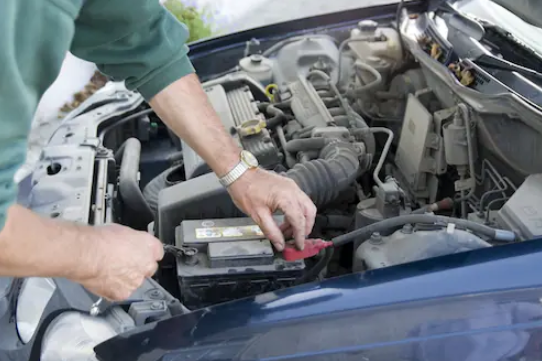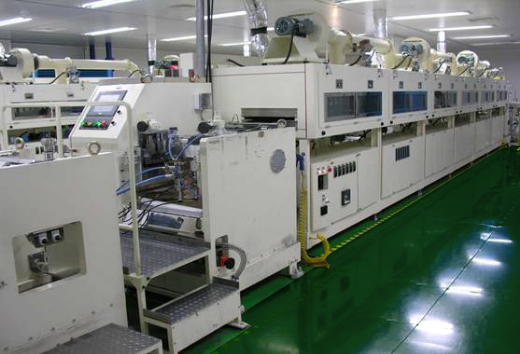Lithium Battery: Powering the Future of Electric Vehicles
Electric vehicles (EVs) are rapidly gaining popularity as a sustainable alternative to traditional gasoline-powered cars. One of the most critical components of an EV is its battery. Lithium-ion batteries have emerged as the frontrunner in this field, paving the way for the future of electric mobility. This article explores the significance of lithium batteries and their role in powering the future of electric vehicles.
Lithium batteries have revolutionized the way we think about energy storage. They are lighter, smaller, and more efficient than their predecessors, making them an ideal choice for electric vehicles. The key to their success lies in their chemistry. Lithium-ion batteries utilize lithium compounds as electrodes to store and release energy during the charging and discharging process.
The advantages of lithium batteries are numerous. Firstly, they have a higher energy density, meaning they can store more energy in a smaller and lighter package. This translates to longer driving ranges for electric vehicles, addressing one of the main concerns for potential EV buyers – range anxiety. With the continuous advancements in lithium battery technology, EVs are gradually closing the gap with traditional cars in terms of range.
Furthermore, lithium batteries offer faster charging times compared to other rechargeable batteries. This is crucial for EV adoption as it reduces the time spent waiting for a vehicle to recharge. As charging infrastructure continues to expand, quick charging capabilities become even more critical to the widespread acceptance of electric vehicles.
Another significant advantage of lithium batteries is their longer lifespan. They can endure more charge-discharge cycles compared to traditional lead-acid batteries, providing a more sustainable and cost-effective solution for EV owners. The longer lifespan of lithium batteries also contributes to reducing waste and environmental impact.
In addition to their suitability for EVs, lithium batteries have found applications in various other industries. They power our smartphones, laptops, and other portable electronic devices. Moreover, they are utilized in renewable energy systems, such as solar and wind power, to store excess energy for later use. This versatility further reinforces the importance of lithium batteries as a key component of our future energy landscape.
Despite all the advantages, there are still challenges that need to be overcome for lithium batteries to reach their full potential. One such challenge is the sourcing of raw materials. Lithium is a finite resource, and as the demand for lithium batteries increases, so does the need for sustainable mining practices and recycling programs to ensure the availability and ethical sourcing of lithium.
Another challenge is the safety concerns associated with lithium batteries. Although modern lithium-ion batteries have implemented safety measures to prevent overheating and combustion, incidents of battery fires still occur. Ongoing research and development are crucial to improving the safety standards of lithium batteries to gain the trust of consumers and eliminate any doubts about their reliability.

The industry is already addressing these challenges. Researchers are exploring alternative materials for battery electrodes to reduce the reliance on lithium. New technologies, such as solid-state batteries, are also being developed to improve safety and energy storage capabilities. Governments and organizations worldwide are investing in research and infrastructure to support the growth of lithium battery technology and its application in electric vehicles.
Lithium batteries are the backbone of the electric vehicle revolution. Their high energy density, fast charging capabilities, and long lifespan make them the ideal choice for powering the future of electric mobility. However, challenges such as sourcing and safety concerns must be addressed to ensure their sustainable and widespread adoption. With continuous advancements in lithium battery technology and the joint efforts of governments, organizations, and researchers, the future of electric vehicles powered by lithium batteries looks promising.
-
 Portable jump starter battery packs have become increasingly popular in recent years as a solution to dead car batteries. No longer do drivers have to rely on another vehicle or wait for roadside assistance to arrive. With a portable jump starter battery pack, you can jump start your car quickly and easily, without the need for another vehicle or any...اقرأ أكثر
Portable jump starter battery packs have become increasingly popular in recent years as a solution to dead car batteries. No longer do drivers have to rely on another vehicle or wait for roadside assistance to arrive. With a portable jump starter battery pack, you can jump start your car quickly and easily, without the need for another vehicle or any...اقرأ أكثر -
 In today's world, energy storage is becoming increasingly important as we strive towards a more sustainable future. With the rise of renewable energy sources such as wind and solar power, there is a growing need for efficient and reliable energy storage solutions. One promising technology that is emerging as a leading contender in this field is the lithium iron phosphate...اقرأ أكثر
In today's world, energy storage is becoming increasingly important as we strive towards a more sustainable future. With the rise of renewable energy sources such as wind and solar power, there is a growing need for efficient and reliable energy storage solutions. One promising technology that is emerging as a leading contender in this field is the lithium iron phosphate...اقرأ أكثر -
 Are you looking for a reliable power storage solution? Look no further than the High-Capacity 12V 100Ah LiFePO4 lithium battery. This advanced battery technology offers several benefits over traditional lead-acid batteries, including longer lifespan, faster charging, and more efficient power delivery. At the heart of the High-Capacity 12V 100Ah LiFePO4 lithium battery is advanced lithium iron phosphate (LiFePO4) chemistry....اقرأ أكثر
Are you looking for a reliable power storage solution? Look no further than the High-Capacity 12V 100Ah LiFePO4 lithium battery. This advanced battery technology offers several benefits over traditional lead-acid batteries, including longer lifespan, faster charging, and more efficient power delivery. At the heart of the High-Capacity 12V 100Ah LiFePO4 lithium battery is advanced lithium iron phosphate (LiFePO4) chemistry....اقرأ أكثر -
 المقدمة: تعد بطارية LiFePO4 بقدرة 12 فولت و100 أمبير في الساعة الحل الأمثل لتشغيل أجهزتك بكفاءة. سواء كنت تستخدمها في نظام RV أو القارب أو الألواح الشمسية، فقد تم تصميم هذه البطارية لتوفير أداء موثوق ومتسق. الميزات: 1. كثافة طاقة عالية: تتميز بطارية LiFePO4 الخاصة بنا بكثافة طاقة أعلى من البطاريات الأخرى، مما يعني أنها يمكنها...اقرأ أكثر
المقدمة: تعد بطارية LiFePO4 بقدرة 12 فولت و100 أمبير في الساعة الحل الأمثل لتشغيل أجهزتك بكفاءة. سواء كنت تستخدمها في نظام RV أو القارب أو الألواح الشمسية، فقد تم تصميم هذه البطارية لتوفير أداء موثوق ومتسق. الميزات: 1. كثافة طاقة عالية: تتميز بطارية LiFePO4 الخاصة بنا بكثافة طاقة أعلى من البطاريات الأخرى، مما يعني أنها يمكنها...اقرأ أكثر -
 The increasing demand for power storage solutions is driving the development of various energy storage systems, including batteries. Among them, the LiFePO4 lithium battery stood out as a promising option due to its high energy density, long cycle life, and low environmental impact. In this article, we will explore the benefits and applications of the 12V 100Ah LiFePO4 lithium battery...اقرأ أكثر
The increasing demand for power storage solutions is driving the development of various energy storage systems, including batteries. Among them, the LiFePO4 lithium battery stood out as a promising option due to its high energy density, long cycle life, and low environmental impact. In this article, we will explore the benefits and applications of the 12V 100Ah LiFePO4 lithium battery...اقرأ أكثر -
 In the world of batteries, there are many different types and technologies available. One of the most popular and promising technologies is the lithium iron phosphate (LiFePO4) battery. This type of battery has become increasingly popular in recent years, due to its high capacity, long lifespan, and excellent safety profile. In this article, we will take a closer look at...اقرأ أكثر
In the world of batteries, there are many different types and technologies available. One of the most popular and promising technologies is the lithium iron phosphate (LiFePO4) battery. This type of battery has become increasingly popular in recent years, due to its high capacity, long lifespan, and excellent safety profile. In this article, we will take a closer look at...اقرأ أكثر -
 Portable car jump starters are becoming increasingly popular due to their convenience and effectiveness. These devices are compact and lightweight, making them easy to carry around in your car or take with you on the go. They are designed to jump-start your car battery when it is dead or low on power, and they can also be used as a...اقرأ أكثر
Portable car jump starters are becoming increasingly popular due to their convenience and effectiveness. These devices are compact and lightweight, making them easy to carry around in your car or take with you on the go. They are designed to jump-start your car battery when it is dead or low on power, and they can also be used as a...اقرأ أكثر

